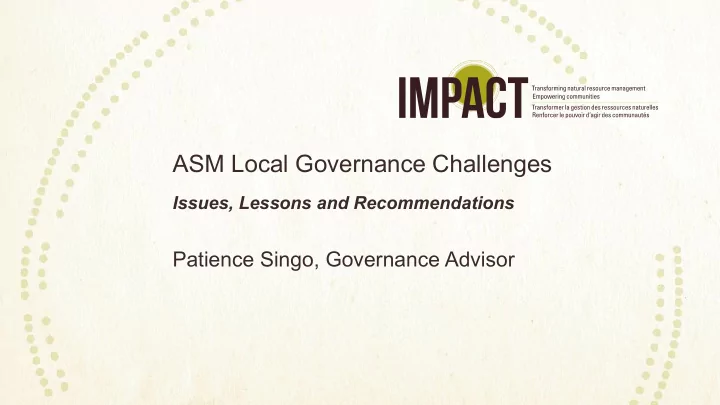

ASM Local Governance Challenges Issues, Lessons and Recommendations Patience Singo, Governance Advisor
ASM Local Governance Context • ASM local governance - political and institutional processes for decision making and implementation (legalisation and formalisation) • Effective governance characterised by free and active participation, accountability, transparency and respect to the rule of law. • Good local governance should deliver on economic development, efficient management and administration, social inclusion and environmental sustainability.
ASM Governance Challenges • Illegality and informality- Most ASM is illegal and informal • Resource conflicts - mining companies, miners, farmers, other land users • Illegal/illicit trade of minerals- local mineral production unaccounted for, grey economy, revenues missed, financing of armed groups . • Tax/fees evasion - local levies and resources access fees • Human rights/Social security- safety, health, child labor, gender issues • Environmental impacts - poor environmental practices, sustainable management of resources 3
Political and Administrative Challenges • Political will- to implement ASM legal framework • ASM management capacity - to provide services, sector management • Integrating the sector into local development agenda - Promoting its potential for development and livelihood resilience. • Well managed ASM can develop into small enterprises • Donor dependency- abdication of local government roles; donors more active than local government; sustainability risk • Cash cow mentality- Limited fiscal resources in local areas, corruption • Human rights/Marginalization - crack down, indiscriminate arrests, top down decisions 4
Governance to economic development- Gold ld supply ly chain ins In 2010 legalized ASM, 2014 created ASM gold trading legal framework. Until 2014 the ASM gold production was not accounted for; Royalties reduced from 10% to 2.5% and host of other measures Currently one province is collaborating with partners to set up one stop gold buying center/refinery. So Source; SAM Proje ject 5
Experiences and Lessons Learned • Political will and ownership- Bilateral leverage/support • Understanding of economic potential of the sector- conditions for economic linkages • ASM Management Capacity and resourcing is key • Respect for human rights- employment, property rights, vulnerable groups • Simple formalization, taxation procedures • Good ASM practices encourage positive stakeholder influences • Advocacy and empowerment of different actors 6
Recommendations • Capitalize on more than 16 years of ASM experience in Latin America and Mongolia- many lessons, not much known! • Mainstream Human Rights Based Approach and explore ASM potential for local economic development- business development. • Regional approach for increased impact and cross learning • Explore greater private sector role in supporting ASM initiatives. 7
ASM Governance Support; Entry ry Points Government, Administration ASM Communities Advocacy on legalization and sector’s potential for Increased knowledge of ASM legal and policy framework economic development. Advocacy and empowerment Strengthen capacity to implement legal framework and Strengthen capacity to demand services, procedures and provide services (health, safety, environment, compliance and training responsible supply chains ); Institutional strengthening Capacity to engage in responsible mining Facilitative role with private sector and ASM Multi-stakeholder platforms Regional collaboration on ASM supply chains and Pilot mineral supply chain initiatives harmonization of fiscal regimes Integrate ASM in poverty reduction and local Local investment, livelihood diversification, value development strategies; Understanding of sector addition, linkages potential Capacity to deliver on Human rights and gender sensitive Gender mainstreaming, child protection and vulnerable services groups 8
Visit our website for more information www.impacttransform.org
Recommend
More recommend